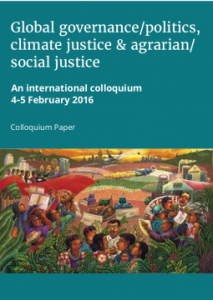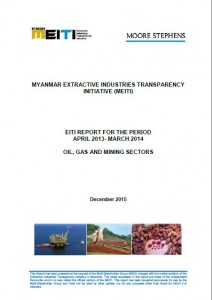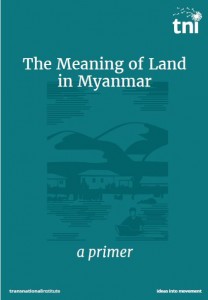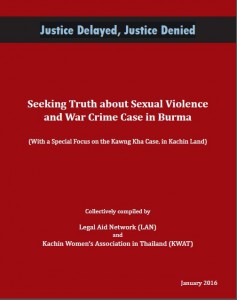ASEAN (150 found)
Land Confiscations and Collective Action in Myanmar’s Dawei Special Economic Zone Area: Implications for Rural Democratization
 The recent political and economic liberalization in Burma/Myanmar, while indicative of some positive steps toward democratisation, has increased foreign and domestic investments and geared the economy toward industrialisation and large-scale agriculture. Land governance procedures and implementation tend to favour the more powerful and well-connected, with little protection mechanism for the majority smallholding farmers in the country.
The recent political and economic liberalization in Burma/Myanmar, while indicative of some positive steps toward democratisation, has increased foreign and domestic investments and geared the economy toward industrialisation and large-scale agriculture. Land governance procedures and implementation tend to favour the more powerful and well-connected, with little protection mechanism for the majority smallholding farmers in the country.
Myanmar Extractive Industries Transparency Initiative (MEITI) Report for the period April 2013- March 2014 Oil, Gas and Mining Sectors
 The purpose of this Report is to reconcile the data provided by companies operating in the extractive sector (hereafter referred to as “Companies”) with the data provided by relevant Government Ministries and Bodies (hereinafter referred to as “Government Bodies”) […]
The purpose of this Report is to reconcile the data provided by companies operating in the extractive sector (hereafter referred to as “Companies”) with the data provided by relevant Government Ministries and Bodies (hereinafter referred to as “Government Bodies”) […]
The Meaning of Land in Myanmar
 “Land is like our vein; it is vital for our living. After our land was confiscated, we don’t know what to do for our livelihood,” says a farmer from Kachin State in Myanmar […]
“Land is like our vein; it is vital for our living. After our land was confiscated, we don’t know what to do for our livelihood,” says a farmer from Kachin State in Myanmar […]
ျပည္သူမ်ား၏ ဆႏၵနွင္႔ ကိုုက္ညီစြာ ရပ္ကြက္သိုု႔မဟုုတ္ေက်းရြာအုုပ္စုု အုုပ္ခ်ဳပ္ေရးမႈးမ်ားေရြးခ်ယ္တင္ေျမွာက္နိုုင္ေရး စည္းရံုးလႈံ့ေဆာ္ေရး လႈပ္ရွားမႈ
လႊတ္ေတာ္သက္တမ္းနွင္႔တူညီေသာ လက္ရွိ ရပ္ကြက္သိုု႔မဟုုတ္ ေက်းရြာအုုပ္စုု အုုပ္ခ်ဳပ္ေရးမႈးမ်ားသည္ ၂၀၁၆ ခုုနွစ္ ဇႏၷဝါရီလ ၃၁ ရက္ေန႔တြင္ သက္တမ္းကုုန္ဆံုုးမည္ျဖစ္၍ အသစ္ျပန္လည္ေရြးေကာက္မႈမ်ားကိုု ဇႏၷဝါရီလ ၃၁ ရက္ေန႔အတြင္း အၿပီးျပဳလုုပ္ေတာ႔မည္ဟု လက္ရွိအစိုးရမွ ထုတ္ျပန္ညႊန္ၾကားထားၿပီ ျဖစ္ပါသည္ […]
• • •The Need for Peace and Inclusion
The peoples of Myanmar have long desired a platform for inclusive peace and dialogue where the vital issues of politics, economics, welfare and human rights for all can be discussed together, fully and in a spirit of national reconcilitation and cooperation. Thus any initiative towards peace and dialogue is always welcome […]
• • •Report and Recommendations of the Session of the Sub-Committee on Accreditation (SCA): Report and Recommendations of the Session of the Sub-Committee on Accreditation (SCA) Geneva, 16-20 November 2015
1.1. In accordance with the Statute (Annex I) of the International Coordinating Committee of National Institutions for the Promotion and Protection of Human Rights (ICC), the SCA has the mandate to consider and review applications for accreditation, reaccreditation and special or other reviews received by the National Institutions, […]
• • •Medical Crisis for Political Prisoners of Letpadan Case
There has been a significant deterioration in the health and well-being of 53 students and supporters who have been detained without bail for nine months at Thayawaddy prison. Their criminal trial has now dragged on for nine months. If convicted, they could face up to ten years in prison […]
• • •UNFC on NCA and Internal Peace
Burma/Myanmar, after receiving independence on January 4, 1948 from the British colonialists in accordance with the Panlong Agreement, was accompanied by the civil war. Since the rulers of successive eras have tried to end the civil war, in disregard of the Panlong Agreement, they have not met with any success, up to this day, and people of all the nationalities have to continue to suffer the malicious caprices and dreadful consequences of war […]
• • •Justice Delayed, Justice Denied
 Despite the so-called democratic transition taking place since 2010, Burma remains constitutionally under the control of the Armed Forces. However, our national democratic icon, democratic forces, some ethnic armed organizations, many NGOs — especially GON¬GOs – and most of the international community are siding with or exercising a policy of appeasement with the power holders, without scrutinizing whether the source of their pow¬er emanates from the genuine will of the various ethnic nationalities and/or indigenous peoples […]
Despite the so-called democratic transition taking place since 2010, Burma remains constitutionally under the control of the Armed Forces. However, our national democratic icon, democratic forces, some ethnic armed organizations, many NGOs — especially GON¬GOs – and most of the international community are siding with or exercising a policy of appeasement with the power holders, without scrutinizing whether the source of their pow¬er emanates from the genuine will of the various ethnic nationalities and/or indigenous peoples […]
Government Troops Attack Ta’ang Village in Lashio, Killing two Villagers, one Mentally Disabled
On January 4, 2016, Burma’s Independence Day — celebrated with military parades in Naypyidaw and Yangon — government troops attacked a Ta’ang village in Lashio township, northern Shan State, killing two villagers, including one who was mentally disabled […]
• • •
 All posts
All posts